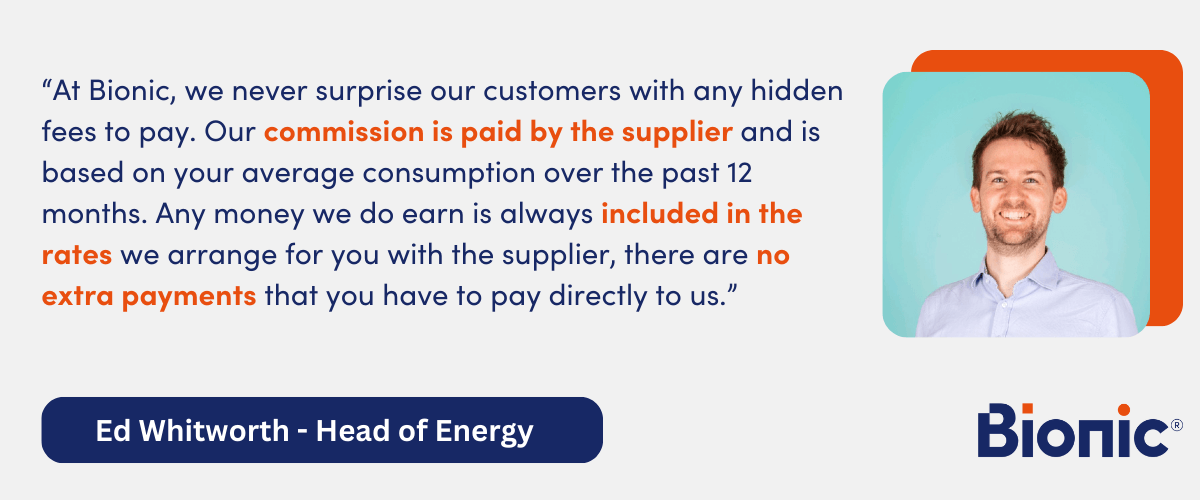Energy brokers for businesses: How to choose a utility broker
It's estimated around 3,000 energy brokers and third-party intermediaries (TPIs) currently operate in the UK's non-domestic energy market. That's a lot of choice to help you compare business energy and switch suppliers.
But there is currently no direct regulation in place for these TPIs. The lack of licensing and regulation, along with soaring energy prices and suppliers going bust, has caused a lot of negative press for the energy industry in recent years. And some rogue brokers have also added to customers' dissatisfaction.
While Ofgem doesn't directly regulate or license energy brokers, it does set out voluntary principles for their operation, as detailed in the TPI programme.
And suppliers are required to only work with brokers registered with the Energy Ombudsman. So there are ways to help ensure you find a reliable broker that will work in your interests and not surprise you with hidden commission or additional fees. At Bionic, we work with a panel of suppliers and always disclose our commission before any contracts are signed. So you can be sure we're a brand you can trust.
All business owners need suppliers and brokers that they can trust 100%. To help restore faith and provide transparency, we’ve put together this guide on energy brokers for businesses. We’ve broken down what they are, how to spot a good one and what you need to do before speaking to one. Keep on reading…

Five-point summary
- An energy broker works with selected suppliers to find and arrange energy deals. They act as the middleman between the customer and the supplier to find better rates, organise renewals and provide advice to customers. They can act across both the domestic and commercial markets.
- The main difference between an energy broker and a consultant is that a consultant is fee-based and brokers earn commission on contracts. Consultants also provide deeper business analysis and consult on energy efficiency.
- The benefits of using a broker include expert advice, quick service and contract management. When choosing your energy broker, you should consider their transparency, knowledge and track record to avoid hidden costs.
- Before speaking to a broker, you should have a business address, supplier information, MPAN number and a letter of authority to hand. This is so agents can find all the information they need to find you a quote.
- Suppliers are required to only work with brokers registered with the Energy Ombudsman, a service that helps resolve disputes. At Bionic, we work with a panel of suppliers and always disclose our commission before any contracts are signed.
What is a business energy broker?
A business energy broker works with selected suppliers to find and arrange new energy deals for customers. This is normally on behalf of energy providers, helping business owners secure a new contract in the process. Most brokers have partnerships with certain suppliers so they can offer the best business energy deals and tariffs. This could include a better price, a different provider or a longer contract length. Energy brokers can work across both the domestic and business market.
At Bionic, we proudly operate in the business market only, working with a panel of top UK business energy suppliers to help SMEs secure their new contracts.
The role of a business energy broker doesn’t just stop when they land you your next deal. They are also responsible for keeping you in the loop until your contract goes live, and informing you before it comes to an end. And if you need to switch suppliers, they should make sure the process is as smooth as possible.
Energy brokers also offer advice to customers on business energy meters, readings and the conditions of the energy market to help with future business decisions.
What’s the difference between an energy broker and a consultant?
Although they both offer business energy advice, there are some clear differences between an energy broker and an energy consultant. So, if you’re wondering which one to go for, consider these points:
| Energy Broker | Energy Consultant |
| Commission based | Fee-based |
| Works with partnered suppliers | Reviews all suppliers |
| Mostly focused on customer price savings | Considers price, efficiency & carbon footprint |
| Deals with switching suppliers and contract renewals. Handles all the admin and paperwork between the supplier and customer | Studies your business’s energy activities and trends. Identifies inefficiencies, making suggestions on suppliers, budgets and more. |
Commission vs fees
An energy broker works on a commission basis. This means for any energy contract agreed between a business and supplier, they get a commission. This commission is settled with the supplier and included in the contract price. Although some brokers may still charge hidden fees, so always check your terms and conditions or ask the broker directly.
For more information on our commission, read our terms and conditions.

Ed continues...
"If you take out a contract with us, we’ll tell you over the phone exactly how much commission your supplier will pay. If your contract is arranged by email, then we’ll email you confirmation of this figure. In all cases, we let you know how much commission is paid before your contract is sent. For complete transparency, you will find the amount of commission we earn from your contract clearly stated in your contract terms and conditions.” - Ed Whitworth, Head of Energy.
Select suppliers vs the whole market
Normally, an energy broker has a range of suppliers ‘on their books’, meaning they work with selected suppliers - but not all. An energy consultant considers all suppliers on the market.
Neither one is better than the other, they are simply different approaches. At Bionic, our suppliers are vetted and we only work with the best providers. We partner with the ‘big six energy suppliers’, but also small independents too.
Read more about how our service works.
Cost savings vs business efficiencies
Although both brokers and consultants take into account the needs of each business; a broker will search the market for a way to save the customer money. Sometimes this means locking in rates for up to three years to guarantee no sudden price hikes for customers.
On the other hand, a consultant will research the business in depth and consider ways to improve it. They consider price but also look into efficiency, and carbon footprint to discuss other ways to save their clients' energy.
Deals and contracts vs business activities
Energy brokers are negotiators and love a good price, they organise contracts and renewals based on business needs. They don’t deep dive into the details of your business operations as it’s not within the scope of their services.
Energy consultants get to know your business like it’s their own. They advise you on ways to maximise energy efficiency across your whole business operations.
Here’s a scenario where you might use both services:
If you run a business that uses a lot of machinery for production and your energy contracts are coming to an end, you might get in touch with an energy broker for a new quote. But because you’re busy; you let the broker deal with all the formalities and hassle of finding a new contract. All you need to do is call them up, agree on a deal and sign it.
A few months down the line, you might be looking for other ways to save business costs. You might want to look at the efficiency of the machinery you are using and its carbon emissions. To save on time, you might hire an energy consultant who can study your business operations, your machinery, look at market trends and provide solutions for you.
Are UK energy brokers regulated?
In the UK, energy brokers aren’t directly regulated by Ofgem. The energy ombudsman regulates the UK's gas and electricity markets, specifically focusing on companies involved in the generation, transmission, and supply of energy, but not the brokers who help you find the deals.
That means not every broker plays by the same rules, and this absence of regulation can lead to inconsistencies in service quality and transparency across the industry.
At Bionic, we set ourselves apart by championing clarity and trust. Our commitment is to offer straightforward, jargon-free advice, ensuring that businesses understand their energy options before signing a contract (remember, non-domestic energy contracts don't have a cooling-off period).
And we always let customers know our commission before they sign with a new supplier, so there are no hidden fees or additional costs to worry about. Bionic has disclosed commission to our customers since 2016, some six years before it became a legal requirement.
We collaborate only with reputable suppliers, aiming to secure the best deals tailored to each business's needs. Our blend of expert guidance and advanced technology streamlines the switching process, making it efficient and hassle-free.
Who can benefit from using an energy broker?
Every business can benefit from using an energy broker. Brokers take away the heavy lifting from business owners - from research to comparisons and price negotiations, so business owners can focus on running the actual business.
According to The Office for National Statistics (ONS), in 2019 micro businesses spent around 20% of total business purchases on energy, with that figure likely creeping up in the last few years - it’s no wonder that getting a better price is the main driver when it comes to a new deal.
As a business owner, you may want to speak to an energy broker in the following circumstances:
- You are out of contract and your energy prices have suddenly skyrocketed
- Your contract is coming to an end and you need a new quote
- You don’t have the time to research a new energy deal
- You feel more comfortable talking with experts than doing it all yourself
How much do business utility brokers cost?
As mentioned above, brokers don’t charge directly for services. Instead, brokers take a commission from any agreements between customers and suppliers. Commission rates are different depending on the broker but are normally based on unit rates and contract length. The key thing for you as a customer is to make sure your broker lets you know their commission upfront and make sure there are no hidden fees.
How do business energy brokers compare suppliers?
Energy brokers will compare different providers when considering the needs of a customer. Based on what's needed, they normally consider the following:
- The length of the contract
- The price of the contract (in kWh)
- Price savings for the customer
- The terms of the contract
- General market trends
Energy brokers use an internal system to locate your existing supplier information, including provider and contract start and end date. All you need to do is provide your business address. Normally, providers will want to speak to you on the phone to discuss a new energy deal, this is because there may be additional information they need and it’s much easier to finalise a contract over the phone.
The pros and cons of using an energy broker
If you’re not sure whether to get help from an energy broker or not - we’ve laid out the pros on cons so you can make an informed decision:
Pros:
- Saves you time researching
- Saves you money (with a better deal)
- You receive advice from an expert
- It’s easily sorted over the phone
- You gain access to all your energy information
- In the loop for contract live dates and renewals
- You avoid rolling into ‘out of contract’ terms
- You don’t pay a direct fee for the service, brokers receive a commission
Cons:
- They don’t work with all energy providers, only vetted partners
- They don’t offer business analyses for efficiency and improvements
- They don’t dive into your business operations for other ‘green solutions’.
Although energy brokers don’t offer all the services a consultancy does, it’s generally considered the best way to go if you need a quote or want to discuss your business energy needs for the first time. In fact, in 2018, 67% of SMEs used a broker to help them with business energy matters. And brokers continue to help businesses navigate the recent economic difficulties they face in whatever way they can.
Read our guide on what the cost of living means for small businesses.
Things to consider when choosing an energy broker
If you’ve decided it’s time to find a new supplier, you’ll want to make sure you’re using a trusted broker that you can rely on. Before picking up the phone, make sure to do your research and consider the following:
- Partnered energy suppliers - every broker has access to different commercial energy suppliers. Normally these are clearly stated on their website. You can easily check if you are happy with these and if there are any suppliers you want to avoid.
At Bionic we work with a wide range of suppliers including the ‘big six’ - British Gas (BG lite and British Gas Plus), EDF Energy, EON and ScottishPower. Find out more and compare business energy suppliers.
- Track record & transparency - untrustworthy brokers will not provide clear transparency about the commission they earn, or disclose any other fees upfront. This means you could pay hidden fees. You can normally find full disclosure about these in their terms and conditions.
Read up on our terms and conditions.
- Wealth of knowledge - another way to know if a broker is reliable is to take a clear look at their website for knowledge on the topic. Do they have customer information in the form of guides or blogs? Do they keep their website updated with recent market developments? This shows they are experts who understand the commercial energy market and are the first to inform customers of updates.
Discover our business energy guides.
- Renewal support - all contracts eventually come to an end. Reliable brokers know this and will keep in touch with existing customers ahead of time to fix a new deal before the renewal date. You should check online to see if they mention anything about renewals and how they go about them.
We deal with our renewals online, read all about our Digital Renewals service.
- Ongoing support - The time between signing a business energy contract and its live date can be up to nine months. During this time, a trusted supplier should keep customers informed of any updates, especially if they are switching suppliers. So you should check if they have a responsive customer service team in case you need to contact them.
At Bionic, we send out emails when appropriate to keep you updated on the progress of your new contract or renewal. We also have a dedicated customer service team on hand for any queries. See all the ways you can contact us.
How to prepare before speaking to a business energy broker
Now that you’ve chosen a broker, you’re one step closer to closing a new deal. But before you get in touch, you’ll want to have some details to hand to speed up the process. You’ll need the following information to give to your agent:
- Your full business address
- Your current supplier (if you know)
- Meter Point Administration Number (for electricity) and Meter Point Reference Number for gas (MPAN / MPAN number).
- A signed letter of authority (with letterhead)
If you don’t have all of these details, don’t fret. Agents can normally find your current supplier information from your business address, you’ll just need to confirm a few details on the phone.
And when you compare business energy with Bionic, we only need your postcode to get started. We use smart data to find most of the information we need - this saves you the time and hassle of pulling together this information and filling out loads of forms.
If you're not sure how much energy your business should be using, check out our guide to energy usage for businesses.
Is there a difference between an energy broker and a price comparison website?
Although they effectively do the same job, there are differences between some brokers and price comparison websites.
- Brokers work with suppliers and customers to negotiate deals on utilities, insurance and finance. They use their expertise and relationships with those suppliers to help get customers to get a better price. Brokers are paid via commission, which is usually taken from the supplier. But some brokers will charge for their services, so always check before you use their services, and bear in mind you might be charged for the comparison even if you don't switch.
- Price comparison websites are mainly used by non-commercial customers to switch car insurance, compare loans and credit cards, or get a new energy deal. In most cases, both the comparison and the switch are completed online with no need to speak to an expert. Most price comparison websites will also offer business services. The comparison is usually free, then suppliers will pay a commission to the price comparison website upon a switch being completed.
- Bionic sits somewhere in between. We use smart data to get most of the information we need online, like a price comparison website. This lessens the amount of form-filing you need to do and cuts the length of time you need to spend on the phone with an expert. But why is the phone call necessary?
Business energy works differently from household energy, with one of the major differences being that there's no cooling-off period on business energy contracts. This means it's vital that you understand everything before you sign.
How Bionic can support you as your utility broker
At Bionic you can start your comparison journey online, we use a combination of smart technology and human expertise from our agents to lock in the best deals for our customers.
We work with the best business gas and business electricity suppliers and service thousands of businesses every year. We also help with business connectivity and business insurance. Get in touch and become a bionic business today.








